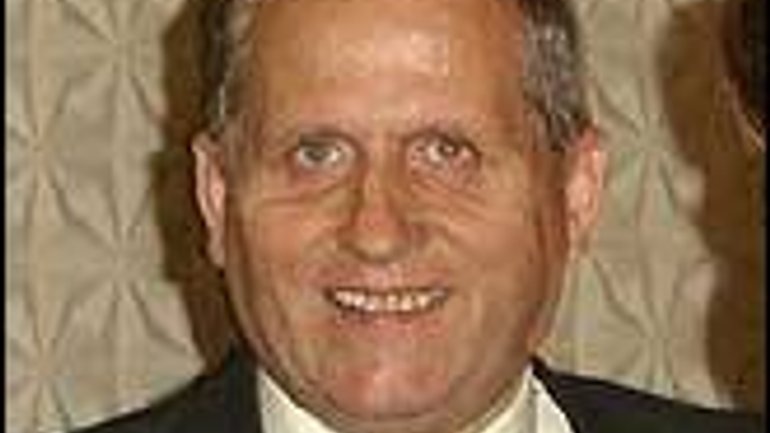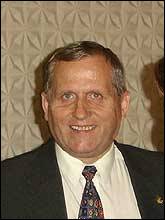"When people know each other on a human, personal basis, interdenominational relations develop more successfully"

 An interview with Petro HANULYCH, secretary general, Ukrainian Religious Liberty Association
An interview with Petro HANULYCH, secretary general, Ukrainian Religious Liberty Association
— Please tell us about the Ukrainian Religious Liberty Association. When was it created and what you do?
— The Ukrainian Religious Liberty Association was instituted at a founding conference on 25 April 2001. The institution was initiated by the International Religious Liberty Association (IRLA), a society active since 1891 that has departments in many countries of the world. Departments were instituted in Russia in 1991. They [the Russian representatives] already had much experience that I had heard about, and I’d also heard of Anatoly Krasikov, president of the Russian Department of the Religious Liberty Association, and Victor Krushenitsky, secretary general. Mr. Krushenitsky and I met with Viktor Dmytrovych Bondarenko ([former] head of [Ukraine’s] National Committee on Religious Matters) in January 2001 and shared our plans about wanting to hold a constituent conference in Kyiv, to invite representatives of religious denominations, scholarly circles, and various civic organizations to propose the institution of a Ukrainian association. So we held the constituent conference, where most participants basically supported the idea of starting [a Ukrainian association]. That’s when the Board of Directors of the URLA was created, being the working organ of the association in the times between conferences. It was supported by Viktor Bondarenko, who even stated his wish to join the Board of Directors. That is how the organization started.
We proposed at the constituent conference a draft of the statutes of the association (initially called “the Ukrainian Department of the International Religious Liberty Association”). When the Board of Directors started work on the statutes, a different name was chosen: the “Ukrainian Religious Liberty Association.” However, we declared in our documents that in our activities we are a department of the international association. John Graz, secretary general of the International Religious Liberty Association, recognizes our conference. We stay in contact with him. Among other things, we have invited him to visit Ukraine on 15-17 December 2005, to which he agreed. We have already worked out a preliminary program of his three-day stay in Ukraine. We think this, too, will help popularize the activities of the association in Ukraine.
— What are the principal objectives of your activities?
— Our principal objectives are the objectives of the International Religious Liberty Association: the protection of religious rights, of freedom of conscience. We have formulated basic positions that should best protect freedom of conscience, such as separation of church and state, denial of official state status to any religion or denomination. We have set priorities, like organizing conferences and meetings between representatives of different denominations to discuss interdenominational relations. We also try to influence the passing of laws concerning religious rights and church-state relations. That is to say, we try to participate wherever these issues are discussed, to articulate our vision of certain positions and laws regulating these relations.
— Why was the [Ukrainian] Religious Liberty Association instituted in 2001, not 1991, as in Russia? Was there some reason, some specific threat to religious freedom, that arose then [in 2001], or was it just a coincidence, or possibly the association became better known?
— I think it was just a stage of Ukraine’s democratic development. Democracy has developed since independence. We had an almost ten-year long stretch of history of an independent Ukraine. We learned of the activities of this organization. We saw all the possibilities for registering our activities. There were no special threats or specific conditions for initiating the creation of the association. It was just the quiet, gradual development of the democracy of civic organizations, the development of civil society in Ukraine, as they say.
— Who belongs to the association today? Is membership limited to denominational groups, or are separate people allowed to join?
— The All-Ukraine Union of the Association of Evangelical Baptists, as well as the union of Pentecostals, have declared themselves collective members of the association. The Ukrainian Greek Catholic Church [UGCC] and the Ukrainian Orthodox Church–Kyivan Patriarchate [UOC–KP] have joined as participants, but not as collective members. Fr. Tabachyk, then-secretary of the UOC–KP, at first joined the Board of Directors. Fr. Tabachyk had actively participated in the association, until he was transferred to serve elsewhere. Currently, the association has no authorized representative from the Kyivan Patriarchate. Representatives of Jewish organizations, as well as Muslims and Hare Krishnas, participated in the constituent conference. The Apostolic Christian Church of Ukraine and the Kyiv community of Universal Pure Religion have recently joined as members. Several people joined as representatives of civic or scholarly organizations, including Viktor Yevhenovych Yelenskyi (who was later elected president of the association), Liudmyla Oleksandrivna Fylypovych, and Oleksandr Nazarovych Sahan, who took part in the constituent conference.
Not all denominations are represented, although we are open. Most say they support the activities of our association whenever we communicate with them. As far as I understand, there is a lack of people to delegate to our civic organization. But on the whole, they accept the activities of our association, because we try not to exacerbate interdenominational relations, but rather to deepen them, to develop and soften them. So, we organize conferences, meetings in the regions or on a national level, trying to direct them towards dialogue and mutual understanding, even simply getting to know each other personally, because when people know each other on a human, personal basis, interdenominational relations develop more successfully.
— Could it be that the organizations which have not joined simply do not feel the need to protect religious freedom? Were there instances when you had to sharply react to some misconduct?
— There were no such exacerbated appeals, thank God. There were instances when aggressive articles would be published, for example articles against the Charismatic community in [eastern Ukrainian] Dnipropetrovsk. We were presented documents proving that the information [published] was not true. These instances took place on a local level, there were no orders from the state. It was down to the activities of certain media outlets.
We had no bitter cases, although we had the support of the Slavic Centre for Law and Justice, especially such famous lawyers as Pchelintsev and Ryakhovsky from Russia. When I had a meeting with Mr. Ryakhovsky during my visit to the Russian Religious Liberty Association as representative of the Ukrainian association, he said that if there are instances of crude violations of the right of freedom of conscience, he was prepared to engage in religious rights protection cases in Ukraine at no charge. But there were no such instances. I know with our Church of Seventh-day Adventists cases when some of our faithful were fired [from their workplaces] for refusing to go to work on Saturday. I think that this is a case when a criminal case could be opened, and rights could be defended. I suggested that the victims file complaints. We even promised to pay back their court-related expenditures. We, as a church, want simply to demonstrate that we do not wish to tolerate this, that we want to protect them. People, probably disillusioned by Soviet courts, possibly also by Ukrainian ones, simply refused, did not want to complain. And so we could not take a single case to court.
— Therefore, we can assume that even fighting religious legal cases in Ukraine is not sufficiently developed, because basically there are no court cases in this field. Are there areas in issues of religious freedom that require special attention?
— I believe there are. At the latest meeting of the directors of the URLA, we raised the issue of a religious component in public education in Ukraine. Strictly speaking, it is a crude violation of religious rights of parents that they have no right to educate their children in a religious spirit as they would wish. They have no right to send their child to a denominational school, where they can be sure that their children will be raised as fully-formed Greek Catholic or Baptist or Orthodox believers, for instance. Unfortunately, parents in Ukraine do not have the opportunity to realize this right of theirs. That is why we mention this inefficiency at all levels, as well as the law “On Freedom of Conscience and Religious Organizations,” which does not provide the right for religious organizations to form their own schools.
Another thing is we wrote a special address from our association concerning the development of a Christian ethics curriculum. We say, among other things, that introducing a religious component, introducing Christian ethics into school, is a guaranteeing of parents’ religious rights in raising their children. We wrote, as well, that this course should be based on the Bible, so that there are no cultural elements to bring in interdenominational strife. The Bible is considered a holy book for Muslims and the Jews as well as for Christians, that is, for almost all denominations in Ukraine. We state that participation in this course be voluntary, so that Buddhists or other religious minorities had the option of not taking a course they do not like. This should also be a way of protecting their religious rights.
— Has real change with regard to religious freedom taken place after the Orange Revolution [in November-December 2004]? Is there more religious freedom, or is there more talk of it now? Have attitudes to the concept of religious freedom changed?
— As believers, we have not felt profound changes. It is nice that the new president started openly talking about spirituality, about religious components in school. He preserved the All-Ukrainian Council of Churches and Religious Organizations (ACCRO). When Viktor Yushchenko was elected president, there were different rumors from the Charismatic churches, among others, about the idea of instituting a “spiritual parliament,” a certain symbiosis of the state and church. They even stated openly that they did not need the ACCRO, that it has trivialized itself, that it failed to justify expectations, because it was suddenly closed, and only 19 denominations out of 120 joined. They were right to a certain extent, but it is certain that the ACCRO has played a positive role in building church-state relations. Finally, Viktor Yushchenko had a meeting with the council. He said it should function as a consulting body, so that he could seek their advice on constructing church-state relations. This is very good, and we hope it promotes religious freedom.
Of course, many of the promises made by Viktor Yushchenko during his election campaign have yet to be fulfilled, such as the promises of returning property to churches which lost their property in the course of the Ukrainian historical process, or promises of lower taxes on electricity and gas, as well as lower taxes on land for churches than for business structures, promises of allocating land for church construction. We expect all of this to become reality.
— Let us hope so.
Interview conducted by Taras Antoshevskyy in Kyiv, 7 October 2005.









